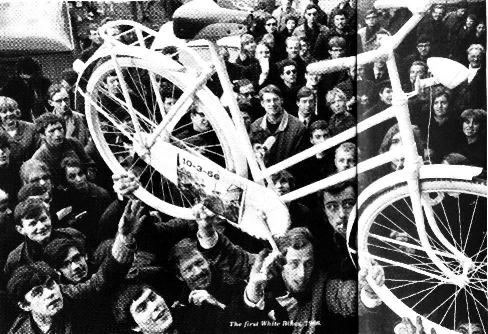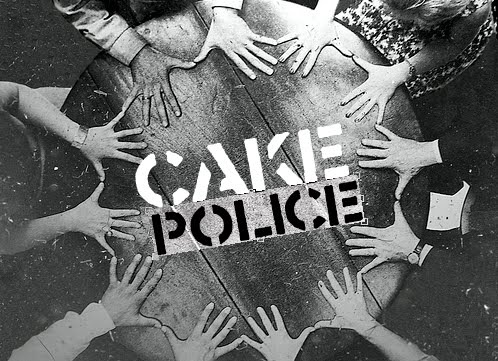
A History Lesson:
there was a dutch radical anarchist group from the sixties called the Provos who are pretty much responsible for all the great things about Amsterdam, they staged happenings and protested the shit that needed to be protested.... also they came up with a bunch of plans for direct social change, check 'em:
"The most famous of all white plans was the White Bike Plan, envisioned as the ultimate solution to the "traffic terrorism of a motorized minority." The brain-child of Industrial designer Luud. Schimmelpenninck, the White Bike Plan proposed the banning of environmentally noxious cars from the inner city, to be replaced by bicycles. Of course, the bikes were to be provided free by the city. They would be painted white and permanently unlocked, to secure their public availability. Schimmelpenninck calculated that, even from a strictly economic point of view, the plan would provide great benefits to Amsterdam.
The Provos decided to put the plan into action by providing the first 50 bicycles. But the police immediately confiscated them, claiming they created an invitation to theft. Provo retaliated by stealing a few police bikes.
The White Victim Plan stated that Anyone causing a fatal car accident should be forced to paint the outline of their victim's body on the pavement at the site of the accident. That way, no one could ignore the fatalities caused by automobiles.
Other White Plans included the White Chimney Plan (put a heavy tax on polluters and paint their chimneys white), the White Kids Plan (free daycare centers), the White Housing Plan (stop real estate speculation) and the White Wives Plan (free medical care for women).
Some White Plans were elaborate, others were just flashes of inspiration. "It seemed that proposing a White Plan was almost a necessary exam to becoming a Provo," says Grootveld. The most hilarious of all was the White Chicken Plan proposed by a Provo subcommittee called Friends of the Police. After the police began responding to Provo demonstrations with increased violence. the Provos attempted to alter the image of the police, who were known as "blue chickens," by proposing new "White Chickens," who would be disarmed, ride around on white bicycles, and distribute first aid, fried chicken, and free contraceptives."
unlike us shit-talkin' web-surfers, they got shit done, for instance, this dude was voted onto the Amsterdam city council and check out how qwerm he is:

they also printed a ZINE just like the cake police!!
"In Provo#12 the magazine was described as:
“a monthly sheet for anarchists, provos, beatniks, pleiners, scissors-grinders, jailbirds, simple simon stylites, magicians, pacifists, potato-chip chaps, charlatans, philosophers, germ-carriers, grand masters of the queen’s horse, happeners, vegetarians, syndicalists, santy clauses, kindergarten teachers, agitators, pyromaniacs, assistant assistants, scratchers and syphilitics, secret police, and other riff-raff. Provo has something against capitalism, communism, fascism, bureaucracy, militarism, professionalism, dogmatism, and authoritarianism. Provo has to choose between desperate, resistance and submissive extinction. Provo calls for resistance wherever possible. Provo realises that it will lose in the end, but it cannot pass up the chance to make at least one more heartfelt attempt to provoke society. Provo regards anarchy as the inspirational source of resistance. Provo wants to revive anarchy and teach it to the young. Provo is an image.” "
we should take some cues from these dudes, 1st step, not letting our rock and roll life styles interfere with the completion of the epically important first issue of CAKE POLICE: PHYSICAL COPY
AND ANOTHER THING.... when they disbanded, their head theorist Roel van Duyn went on to start the Kabouter Party in Amsterdam.... you know what that means in dutch? GNOME, MOTHERFUCKERS..... THE GNOOOOMMEEE PARTTTYYY qwerm out


Does this mean you're going to start riding a bike?
ReplyDeleteno it means im gonna start wearing all white again
ReplyDelete"Provo realises that it will lose in the end, but it cannot pass up the chance to make at least one more heartfelt attempt to provoke society. Provo regards anarchy as the inspirational source of resistance. Provo wants to revive anarchy and teach it to the young. Provo is an image."
ReplyDeleteThis, if anything, is the problem with so much of the contemporary left: political activity isn't a matter of effecting any kind of meaningful change in the structure of society, it's merely a kind of poetic lifestyle entirely satisfied with its ineffectuality. That their object was to "provoke" society rather than in any way to transform it attests to their belief in its immutability. In the final analysis, all a politics like this really demands is that capitalism cede some ground to the free play of its fantasies.
Thats a good point, sheilaownscommunism, but judging how much anything was effected by any kind of movement is and should be relative. You say ineffectuality because the group failed to produce any kind of structural social change in their own time, but the spread of ideas is always significant because ideas can be powerful beyond measure! Everything is ineffective in the context of cosmic time and scale, but anything that is a source of influence or inspiration on a tiny scale could be looked at as a marvel, to the point of inspiring a kid from San Diego to research and write about your movement 40 years later.
ReplyDeleteCool post Brian!
I was trying to say that their ineffectuality was a direct consequence of their ideas, and that any group that would take up these ideas as a model for political action would automatically resign themselves to ineffectuality. I'm not saying that a group's failure to accomplish something is necessarily an index of the ineffectuality of its ideas, but this is clearly a case (and this could be described as a general tendency within much of the contemporary left) where a group made its ineffectuality a condition or a necessary limit of its own activity. They knew their model of political action could accomplish nothing, and it was precisely this knowledge that cleared the ground for their wacky "provocations." This very inability to accomplish anything was what gave free reign to their imagination: so long as one realizes that one "will lose in the end" one can make any number of poetic proposals for changing society, because the risks and difficulties associated with actually undertaking to change the organization of socioeconomic life have effectively been removed from consideration.
ReplyDeleteI guess all this wouldn't bother me so much if it wasn't becoming the dominant model for political activity on the left, and if it wasn't in the final analysis a kind of ideological support of the very "system" it claims to denounce. This kind of leftism "resists" only within the boundaries established by the acceptance of its ultimate failure, which boundaries are precisely those of the imagination. I do think that "imagination" is important to some extent in devising new strategies on the left: of course some of the old modes and proposals need to be abandoned. But on the other hand, and this is much more important, the left needs to restore its contact with reality, which ought to begin precisely with the knowledge of its own present ineffectuality.
you have to be pretty naive to think that just anyone is capable of changing "the structure of society"
ReplyDeletei think youre missing the point of resistance
What's the "point of resistance" if not the transformation of the structure of social life?
ReplyDeletewhats the point of thinking if not the transformation of the structural self?
ReplyDeletewow this series of comments just took a qwerm for the worse
ReplyDeletei think their manifestos and slogans were purely for provocation but the happenings and protests were intended to be effective and not designed to completely coincide with the idea that their revolution was already doomed, i dont think they had the heady goal of destroying capitalism forever, their goal was local progress and they did succeed in restructuring some aspects of dutch social life
it's hard to imagine just what the Provos' true goals were in such revolutionary times but the material they produced, while probably still targeted and distributed mostly towards youth, wasn't meant for the already radical dedicated members of the movement, as they say pretty plainly "Provo is an image," which to me says, "Provo isn't what you think it is, so come figure it out yourself", perhaps it was all a little more thought-out than you give them credit for
regardless of "success", what i take from them mostly is the fact that their movement was a pretty inspiring example of non-violent protest, now let's all head out to the closest military base with signs that say "no blood for oil" or "come on guys, no more war, alright? thank you"
This comment has been removed by the author.
ReplyDelete